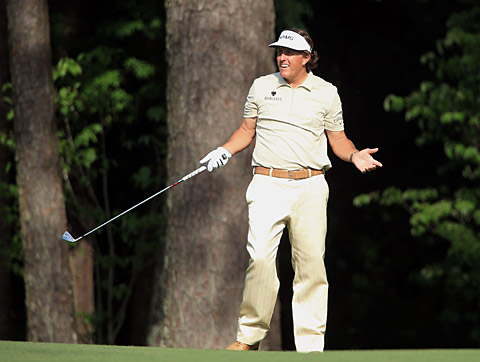Results?


It’s Phil.
Who doesn’t like Phil? I like Phil. I like Phil for who he isn’t (or seems not to be). I like Phil for what he tried to pull off on the par 3 fourth hole where he took a triple bogey. Phil can bounce back from a triple bogey on any course (which he did, by the way, at Augusta) but when competing for his fourth green jacket to tie him with some of the golfing greats, what was he thinking? What was his caddy thinking?
Let me ask you: Do you think Phil was results-driven when attempting to hit his second shot right handed with his club turned around in the brush on the par 3 fourth? This is a trick question by the way.
It seems as though I could write about any golfer in any tournament who may start thinking about results before approaching a critical situation thusly leading to an even worse scenario.
But, here’s where it gets tricky with the mental approach. Remember, I wrote a while back that results oriented thinking is bad? Well, maybe not in this case. The moment may dictate that you step back and assess the complete situation before committing to a shot. This may seem results-oriented (and in a way it is-but that’s ok-back to process). Being the fourth round of a major and a green jacket on the line, if Phil steps away from the situation and thinks about a drop, with his short game, he probably would have bogey-worst case scenario.
Let me put this to you a different way.
You see this type of thinking in baseball, in every game. Watch the pitcher. Watch to see how he pitches to a hitter based upon his match up with the hitter on deck. This is where scouting reports and homework is crucial. Pitchers know weaknesses and strengths of hitters. You typically see, in a tight game situation, where a pitcher will “pitch around” a hitter to get to the next guy who he has had success against. Ah yes, the unintentional-intentional walk.
Phil’s situation and the baseball scenario employ the same basic principles. Ask yourself, what is my best course of action based upon the moment? Walking the hitter who has a .302 average against you to get to a guy who has a career average of .157 against you in a tight spot, is a good play based on the situation.
Or
Taking a drop on the 4th hole, knowing you have 14 more to play with some par 5’s mixed in might have been the good play. Phil knows Augusta better than anyone. His caddy knows Augusta better than anyone (homework, scouting).
In the end, Phil was in the hunt but playing catch-up. Maybe if he took a step back in the weeds on the 4th hole, the story might be different.
So, let me ask you again, do you think Phil was results-oriented when attempting to hit his 2nd shot on the par 3 fourth?
Answer: It’s Phil.
Scott Kapla, Mike Fay Golf Staff Writer
To “follow” Scott on Twitter click here
To follow Scott”s Blog Ed Tech Minute click here
Photo: Golf Digest
